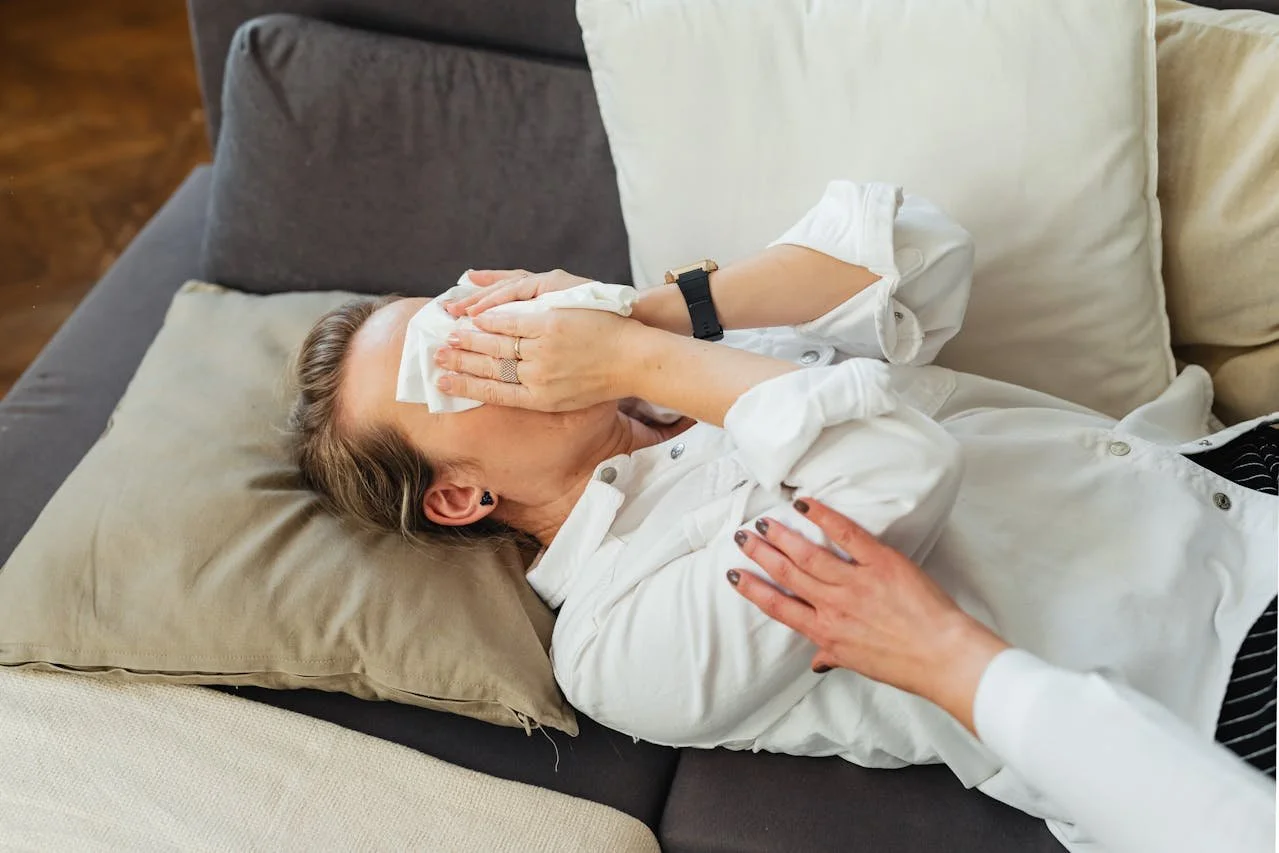
Depression Therapy
Understanding Depression: Types, Symptoms, and Effective Treatment Options
Depression is a prevalent and often debilitating mental health condition that affects countless individuals across the world. While experiencing occasional sadness is a normal part of life, mild depression, moderate depression, or severe depression can have a significant impact on one's overall well-being and quality of life.
According to The National Institute of Health (NIH.gov), in 2021 an estimated 21 million adults in the US had at least one major depressive episode. Also worth noting, depression doesn't discriminate; it can affect individuals of any age, race, or gender, including children and adolescents.
Being educated is key to recognizing depression.
Therefore, on this page, we will explore the following:
● Types of depression
● Symptoms of depression
● Treating depression with psychotherapy
● Different treatment options
● Antidepressant medications
● Next steps in breaking the chains of depression
The Mar Y Sol Promise
Mission: At Mar Y Sol Mental Health Experts, we empower clients across their lifespan to live the lives they want through individualized, holistic mental health treatment.
Vision: Mar Y Sol Mental Health Care is the pinnacle of mental health treatment because we treat your entire being in ways that enhance happiness so you can reach your goals.
Types of depression
Depression can manifest in various forms, such as:
Major Depressive Disorder: A prolonged and intense form of depression that can significantly disrupt daily duties, like eating, sleeping, and working. This usually includes a loss of interest in things that usually create joy.
Persistent Depressive Disorder (Dysthymia): A chronic and long-term mild-to-moderate depression characterized by persistent low mood. While symptoms of depression are less severe, they last much longer, usually for at least two years.
Bipolar Disorder: A mood disorder that involves episodes of depression alternating with manic or hypomanic episodes. People suffering from bipolar disorder experience depressive episodes, where they feel sad, indifferent, or hopeless, combined with a very low activity level. However, they also experience manic episodes, or unusually elevated moods, where they might feel very happy, irritable, or “up,” with a significant increase in activity level.
Seasonal Affective Disorder: When depression symptoms occur seasonally, often during the winter months when it’s cold, there is less natural sunlight, and people stay indoors more.
Postpartum Depression: A type of depression that affects many women after giving birth. Seeking help is critical when experiencing symptoms of postpartum depression.
Atypical Depression: A subtype of depression with unique symptoms like increased appetite and oversleeping.
Symptoms of depression
Symptoms of depression can be mild or severe and can be short-term or long-lasting. Symptoms of depression may include:
● Persistent feelings of sadness, hopelessness, or emptiness.
● Loss of interest or pleasure in activities you once enjoyed.
● Noticeable changes in appetite and weight.
● Sleep disturbances, such as insomnia or excessive sleeping.
● Feeling fatigued more often with a loss of energy.
● Difficulty concentrating and making decisions.
● Feelings of worthlessness or excessive shame or guilt.
● Recurrent negative thoughts of self-harm, death, or suicide.
At Mar Y Sol Mental Health, we understand the impact of depression on your life, and we're committed to helping you regain control and find hope. With effective treatments for depression, you can take the first steps toward a brighter, happier, fulfilled life. Let's explore the approaches that can assist you on your journey to recovery.
Holistic Treatment Options for Depression
Mar Y Sol Mental Health Experts offer a holistic approach to treating mental health conditions, including depression. Holistic treatment includes a combination of treatment interventions, such as psychotherapy, medication, and a variety of tools and coping strategies to provide comprehensive care throughout your lifetime.
We perform a mental health assessment, which includes an overview of your symptoms and medical history in order to determine the best treatment plan for your unique mental health needs.
The positive therapeutic relationship
Research has consistently shown that psychotherapy can be highly effective in treating depression when a positive relationship with your therapist is established. At Mar Y Sol Mental Health Experts, we prioritize building a strong therapeutic relationship based on trust, empathy, and open communication.
This relationship creates a safe and supportive environment for you to explore your thoughts and emotions and empowers you to overcome the challenges that come with the diagnosis of depression.
Treating depression with psychotherapy
Psychotherapy, also known as talk therapy, is a valuable therapeutic approach that involves a skilled mental health professional working with individuals or groups to address emotional, psychological, and behavioral challenges. Helping people gain insight into their thoughts, emotions, and behaviors, this form of treatment is aimed at providing strategies to manage and overcome mental disorders, including depression.
There are various types of psychotherapy, each with its unique techniques and goals. Here are some effective types of psychotherapy:
● Cognitive Behavioral Therapy (CBT): CBT focuses on identifying and changing negative thought patterns and behaviors contributing to depression.
● Humanistic Therapy: This approach emphasizes personal growth and self-actualization, offering a non-judgmental and empathetic space for exploring emotions and personal choices.
● Family Therapy: It addresses family dynamics and helps resolve conflicts while enhancing communication among family members.
● Group Therapy: In group therapy, clients meet with a therapist to share and discuss their experiences and issues, providing support and positive insights.
Psychotherapy goals for treating depression
● Relieve symptoms of depression: Reducing the symptoms of depression, such as persistent sadness and difficulty concentrating, can significantly improve your life.
● Insight and self-awareness: Psychotherapy can help you gain a deeper understanding of your thoughts, emotions, and behaviors, fostering personal growth and self-awareness.
● Learn coping strategies: Learn and develop healthier ways to cope with stress, manage your emotions, and navigate life's challenges.
● Improve relationships: For those undergoing relationship or family therapy, the goal is often to enhance communication, resolve conflicts, and strengthen bonds with family members.
Different Depression Treatment Options
Joining a support group can provide the opportunity to connect with others experiencing similar mental health challenges. Bonding with others while sharing your feelings and experiences in a supportive environment can be therapeutic and help reduce feelings of isolation.
Here are more reasons support groups are helpful:
● Peer support: Support groups for depression bring individuals together who are facing similar mental health problems, creating a sense of community and reducing feelings of isolation. Interacting with peers who relate to your experiences can be comforting and reassuring.
● Validation and empathy: In a support group, participants can openly discuss their symptoms, fears, and mental health struggles without fear of judgment. Validation of your experiences is powerful and helps you feel understood and less alone in your journey.
● Learning and coping strategies: Support groups provide opportunities for members to share effective coping strategies and techniques they've used to manage their depression.
● Reducing stigma: Participants in support groups help reduce the stigma associated with depression and mental illnesses by openly discussing their experiences and challenges. This also helps bring greater societal awareness and acceptance of mental health conditions like depression.
Support groups
Self-Help Strategies
While choosing a healthcare provider to help lead you through your healing journey is crucial, self-help strategies also empower people to take an active role in managing their depression.
Consider trying these self-help techniques and practices:
Get educated: Understanding depression is the first step in managing it. Educate yourself about the different types of depression, common symptoms, triggers, and treatment options. Knowledge is power and can demystify depression and help you feel more in control.
Self-awareness: Pay attention to your thoughts, feelings, and physical sensations. Keep a journal to track your depressive triggers and symptoms. Write down every feeling and emotion you notice. Journaling every day will help provide insights into your depression. It may feel uncomfortable at first, but you will soon recognize the benefits of learning yourself.
Relaxation techniques: Mindfulness practices can help you learn to stay in the present moment, reducing a wandering mind about the past or anxiety about the future. Deep breathing and progressive muscle relaxation promote natural relaxation and reduce depressive symptoms.
Physical activity: Regular exercise has been shown to reduce depression by releasing endorphins, the body's natural mood enhancers. Aim for at least 30 minutes of exercise most days of the week.
Eating healthy foods: Eating a well-balanced diet with plenty of whole foods, lean protein, and omega-3 fatty acids can contribute to improved emotional well-being and reduce symptoms of depression.
Prioritize getting quality sleep: Prioritize getting plenty of sleep. Try creating a relaxing bedtime routine promoting healthy, quality sleep. Sleep plays a crucial role in managing symptoms.
Set clear boundaries: Establish personal boundaries and communicate them to others. This will help reduce stress and prevent the buildup of depressive symptoms.
Celebrate your achievements: Acknowledge and celebrate your successes, no matter how small they may seem. They are a big deal and deserve recognition. Recognizing your progress regularly boosts your self-confidence.
We believe psychiatric medications are a tool that works in conjunction with psychotherapy to help rewire your brain and your life so you can break out of unhealthy patterns and get back on track.
Commonly prescribed antidepressants include:
● Selective Serotonin Reuptake Inhibitors (SSRIs): These medications can help regulate serotonin levels in the brain, which are often linked to depressive episodes.
● Tricyclic Antidepressants (TCAs): TCAs are an older class of antidepressants that work on various neurotransmitters in the nervous system to alleviate depressive symptoms.
● Serotonin-Norepinephrine Reuptake Inhibitors (SNRIs): These are medications that inhibit the reuptake of both serotonin and norepinephrine, affecting mood regulation.
● Atypical Antidepressants: These include a range of medications that work in unique ways to manage depression.
It's essential to consult a healthcare professional trained in psychiatry to manage your medications. They will help you understand potential side effects, consider other medical conditions, and determine the appropriate dosage for your needs.
Antidepressant Medications
Next Steps in Breaking the Chains of Depression
Remember that seeking help is a sign of strength. With the right support, effective treatment options, and resources, you can successfully manage your depression symptoms–whether it's through psychotherapy, antidepressant medications, lifestyle changes, or a combination of these approaches.
Mar Y Sol Mental Health Experts offers comprehensive mental health services in Florida, Connecticut, New York, and Nebraska.
Please reach out today at 203-456-6989 to schedule an appointment and take the first step toward a better tomorrow.
If you or one of your family members is experiencing a mental health crisis, please dial 911 or visit your nearest emergency room.
FAQs
-
The best treatment for depression is usually a combination approach. Often, medication is needed so patients experience symptom relief and are able to better use the coping strategies they learn in psychotherapy. To get our best recommendations, please schedule an appointment by calling 203-456-6989.
-
The majority of insurance plans will cover both medication and psychotherapy. You can call your insurance provider for more details or call our office at 203-456-6989.
-
It can take 4-6 weeks to experience symptom relief. Recent studies show that some patients may have relief within two weeks. When we prescribe medications, we schedule follow-up appointments to check in and monitor efficacy.

















